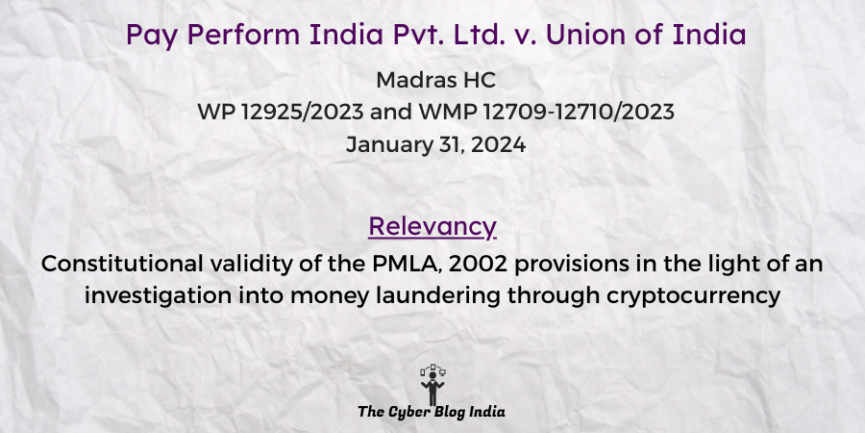Pay Perform India Pvt. Ltd. v. Union of India

Pay Perform India Pvt. Ltd. v. Union of India
In the High Court of Madras
WP 12925/2023 and WMP 12709-12710/2023
Before Chief Justice SV Gangapurwala and Justice DB Chakravarthy
Decided on January 31, 2024
Relevancy of the case: Constitutional validity of the PMLA, 2002 provisions in the light of an investigation into money laundering through cryptocurrency
Statutes and Provisions Involved
- The Prevention of Money Laundering Act, 2002 (Section 5, 8, 17, 18, 24, 45, 50) (“PMLA”)
- The Constitution of India, 1950 (Article 14, 21, 226)
- The Information Technology Act, 2000 (Section 66D)
- The Indian Penal Code, 1860 (Section 120B, 420)
Relevant Facts of the Case
- HPZ, an application-based token, promised users significant gains against their investments. Investors were promised investments in mining machines and other cryptocurrencies. However, the application stopped working, and the investors could not withdraw their funds.
- This resulted in the registration of FIR at the Cyber Crime Police Station, Kohima. The total amount of credits and debits were valued at ₹115 crores as UPI transactions.
- ED conducted a preliminary inquiry into this scam and had reason to believe that the petitioner company and its directors were involved in money laundering. The agency attached their property under Section 5 of the PMLA, 2002.
- The ED conducted searches and seizures to uncover hidden property and evidence related to money laundering, targeting the petitioner under Sections 17 and 18 of the PMLA, 2002.
- The Adjudicating Authority issued notices to the petitioner under Section 8. These notices required them to clarify the sources of their income and assets.
- The petitioner challenged the constitutionality of various PMLA provisions alleging violations of fundamental rights under Article 14 of the Indian Constitution.
Prominent Arguments by the Advocates
The petitioner’s counsel argued that:
- Several provisions of the PMLA, 2002 infringe upon the fundamental rights given in the Indian Constitution.
- The ED’s provisional attachment of their property under the PMLA, 2002 lacked procedural fairness. Such actions also violated the principle of natural justice.
- They emphasised the need for judicial oversight in the adjudication process.
The respondent’s counsel argued that:
- The PMLA provides a crucial legal framework to combat money laundering cases, aiming to protect the financial system’s integrity.
- Effective enforcement measures, including provisional attachment and confiscation of properties, are essential and necessary. It helps prosecute individuals involved in money laundering and related offences.
- These provisions are essential tools in the fight against money laundering and are aligned with the objective of public interest, equity, and fairness.
Opinion of the Bench
- The Adjudicating Authority under the PMLA, 2002 primarily serves an administrative function. It is neither a judicial nor quasi-judicial role.
- The Adjudicating Authority’s function is to form an initial opinion based on reason-to-believe and to make ad-interim orders. It leaves the final decisions for the Special Court.
- Its proceedings aim to ensure fairness and truthfulness in administrative actions rather than resolve disputes, as in judicial proceedings.
- The relevant provisions are constitutionally sound. They provide a practical framework for combating money laundering while safeguarding individual rights.
Final Decision
- The court upheld the validity of provisions of the PMLA, 2002.
